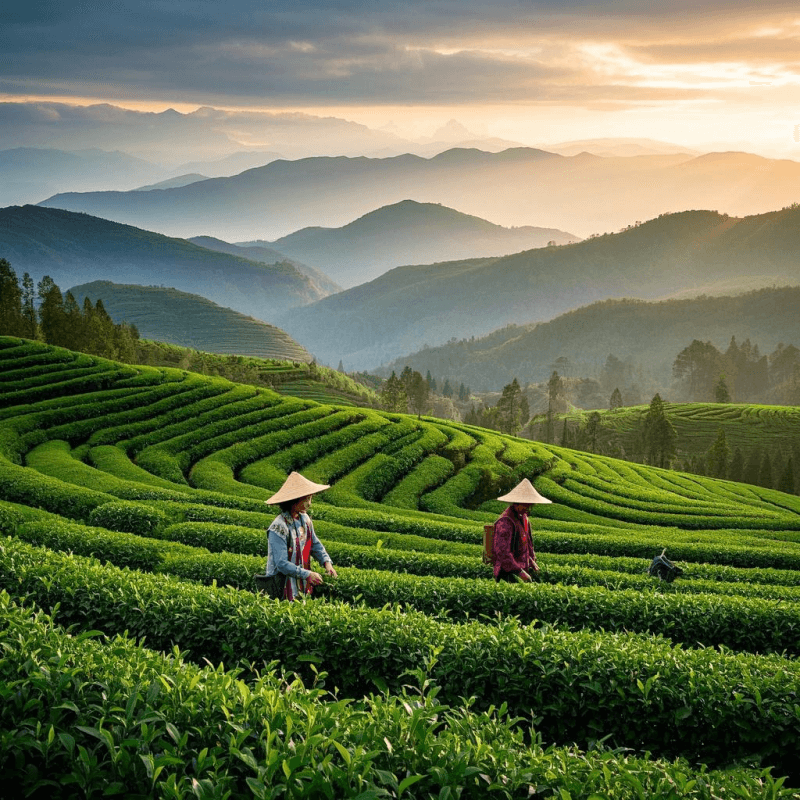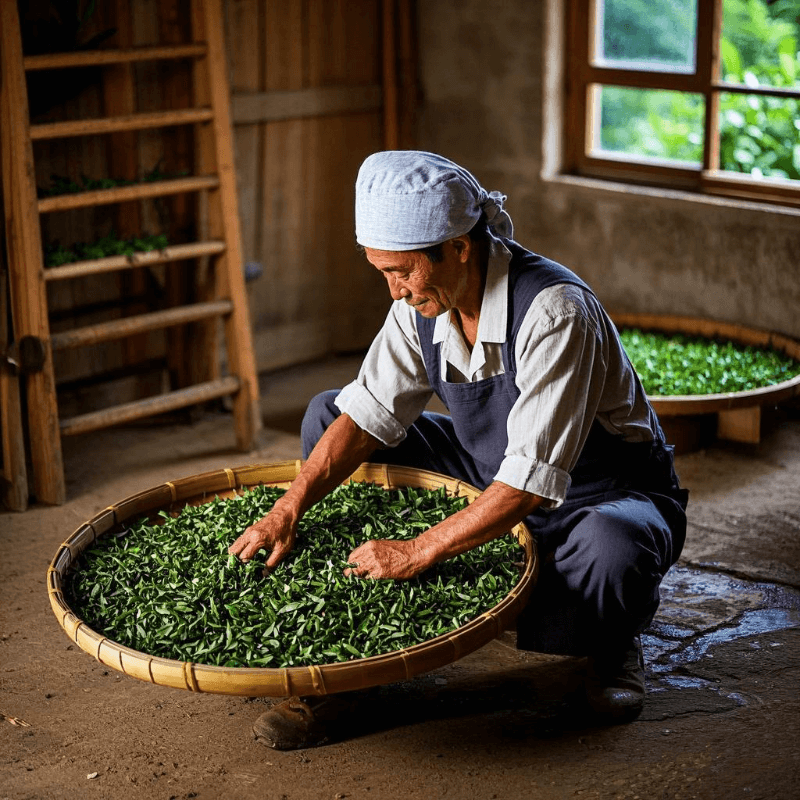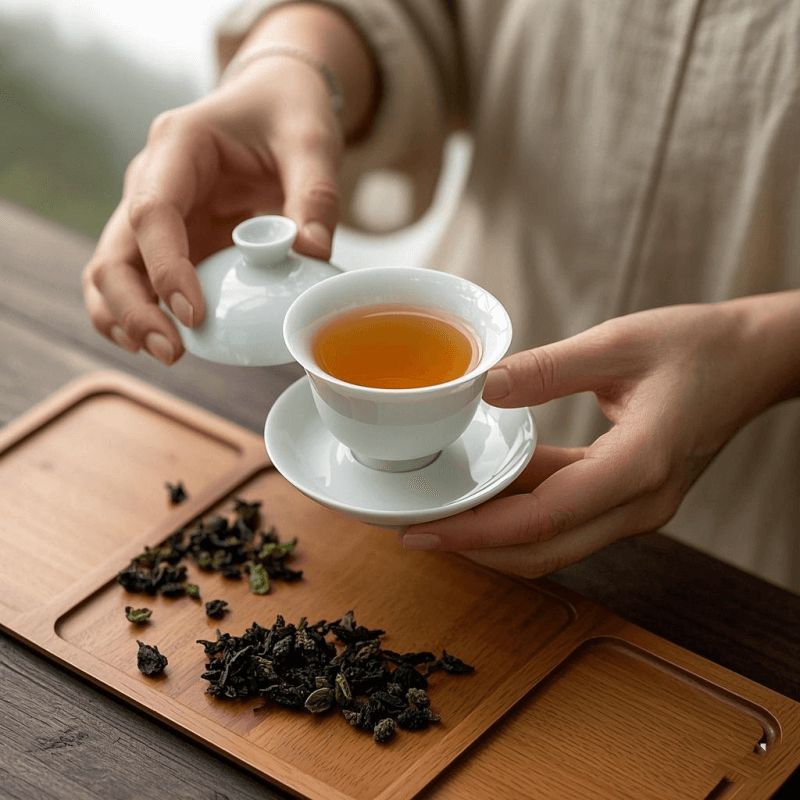
In a world where consumers increasingly prioritize health and sustainability, organic oolong tea has emerged as a beloved choice among tea enthusiasts. Unlike its conventional counterparts, this semi-oxidized brew offers more than just a delicious beverage—it delivers a pure, unadulterated experience, free from synthetic pesticides, fertilizers, and genetically modified organisms (GMOs). But what truly sets organic oolong tea apart, and why should it be a staple in your daily routine?
This comprehensive guide will explore the unique qualities of organic oolong tea, from its distinct production methods and health benefits to practical tips for choosing, brewing, and enjoying the best varieties. Whether you’re a seasoned tea drinker or new to the world of this tea variety, get ready to discover the purity and richness that this beverage has to offer.
1. Introduction: Why Choose Organic Oolong Tea
The decision to choose organic oolong tea goes beyond personal preference; it’s a conscious choice that aligns with health, environmental, and ethical considerations. Here’s why more and more people are opting for this natural alternative:
Health and Wellness
Organic farming practices prioritize soil health and biodiversity, resulting in tea leaves that are packed with nutrients and antioxidants. According to the USDA Organic, organic crops tend to have higher levels of beneficial compounds, such as polyphenols, which can help boost the immune system, reduce inflammation, and protect against chronic diseases. By choosing organic oolong tea, you’re not only enjoying a delicious beverage but also nourishing your body with the purest form of this semi-oxidized brew.
Environmental Sustainability
Conventional tea farming often relies on synthetic pesticides and fertilizers, which can have detrimental effects on the environment. These chemicals can contaminate soil, water, and air, harming wildlife and ecosystems. In contrast, organic farming methods promote sustainable practices, such as crop rotation, natural pest control, and the use of organic fertilizers. By supporting organic tea production, you’re contributing to a healthier planet and helping to preserve natural resources for future generations.
Ethical Considerations
Organic tea production also prioritizes the well-being of farmers and workers. Organic farms typically adhere to strict labor standards, ensuring fair wages, safe working conditions, and social responsibility. By choosing organic oolong tea, you’re supporting a more ethical and sustainable tea industry, one that values the health and livelihoods of those involved in the production process.
As tea enthusiast Emily Carter puts it, “Drinking organic oolong tea is not just about the taste; it’s about making a positive impact on my health and the environment. Knowing that I’m consuming a product that is free from harmful chemicals and produced in an ethical manner gives me peace of mind.”
2. What Makes Organic Oolong Tea Different from Regular Oolong
The key difference between organic oolong tea and regular oolong lies in the production process. Organic tea is grown and processed without the use of synthetic pesticides, fertilizers, herbicides, or genetically modified organisms (GMOs). Instead, organic farmers rely on natural methods to control pests and diseases, improve soil fertility, and promote plant growth.
Organic Farming Practices
Organic tea farms follow strict guidelines and regulations to ensure the integrity of their products. These guidelines typically include:
- Soil Management: Organic farmers focus on building healthy soil by using compost, manure, and other organic materials to improve soil structure, fertility, and water-holding capacity. They also avoid the use of synthetic fertilizers, which can deplete soil nutrients over time.
- Pest and Disease Control: Instead of using chemical pesticides, organic farmers use natural methods to control pests and diseases, such as crop rotation, companion planting, biological control agents (e.g., beneficial insects), and the use of natural pesticides derived from plants or minerals.
- Weed Management: Organic farmers use mechanical or manual methods to control weeds, such as hand-weeding, hoeing, or the use of mulch. They avoid the use of synthetic herbicides, which can harm the environment and human health.
- Harvesting and Processing: Organic tea is harvested and processed using traditional methods that minimize the use of chemicals and preserve the natural flavor and aroma of the tea leaves. The tea leaves are typically hand-picked and processed within hours of harvesting to ensure freshness and quality.
Certification and Labeling
To ensure that organic oolong tea meets the strict standards set by organic certification bodies, it must be certified by a recognized organic certification agency. The certification process involves a rigorous inspection of the tea farm, processing facilities, and production methods to ensure compliance with organic regulations. Once certified, the tea can be labeled as “organic” and is eligible for sale in the organic market.
When shopping for organic oolong tea, look for products that are certified by a reputable organic certification agency, such as the USDA Organic, EU Organic, or JAS (Japanese Agricultural Standard). These certifications ensure that the tea has been produced in accordance with strict organic standards and is free from harmful chemicals and additives.
3. Health Benefits of Organic Oolong Tea

In addition to its purity and natural flavor, organic oolong tea offers a range of health benefits that make it a valuable addition to any wellness routine. Here are some of the key health benefits of organic oolong tea:
Antioxidant-Rich
This semi-oxidized brew is packed with antioxidants, such as polyphenols, catechins, and theaflavins, which can help protect the body against oxidative stress and damage caused by free radicals. These antioxidants have been shown to have anti-inflammatory, anti-cancer, and anti-aging properties, and may help reduce the risk of chronic diseases, such as heart disease, diabetes, and Alzheimer’s disease.
Weight Management
Several studies have suggested that organic oolong tea may help with weight management. The beverage contains caffeine and other compounds that can boost metabolism, increase fat burning, and reduce appetite. Additionally, the antioxidants in this tea variety may help improve insulin sensitivity, which can help regulate blood sugar levels and prevent the storage of excess fat.
Heart Health
Organic oolong tea has been shown to have beneficial effects on heart health. The antioxidants in the tea can help reduce cholesterol levels, lower blood pressure, and improve blood vessel function. Additionally, the caffeine in this semi-oxidized brew can help increase heart rate and improve blood circulation, which can reduce the risk of heart disease and stroke.
Digestive Health
Organic oolong tea may also help improve digestive health. The tea contains compounds that can help stimulate the production of digestive enzymes, which can aid in the digestion of food and prevent digestive problems, such as bloating, constipation, and indigestion. Additionally, the antioxidants in this tea variety may help reduce inflammation in the gut, which can improve gut health and prevent the development of digestive disorders.
Mental Health
This semi-oxidized brew contains L-theanine, an amino acid that has been shown to have calming and relaxing effects on the brain. L-theanine can help reduce stress, anxiety, and depression, and improve cognitive function, such as memory, attention, and focus. Additionally, the caffeine in organic oolong tea can help increase alertness and improve mood, making it a great beverage to enjoy in the morning or afternoon.
4. How to Choose the Best Organic Oolong Tea
With so many organic oolong tea brands and varieties available on the market, it can be challenging to know which one to choose. Here are some tips to help you select the best organic oolong tea for your taste and preferences:
Look for Certification
As mentioned earlier, look for organic oolong tea products that are certified by a reputable organic certification agency, such as the USDA Organic, EU Organic, or JAS. This certification ensures that the tea has been produced in accordance with strict organic standards and is free from harmful chemicals and additives.
Consider the Origin
The origin of the tea can have a significant impact on its flavor, aroma, and quality. Some of the best regions for this tea variety include Taiwan, China, Japan, and India. Each region has its own unique climate, soil, and growing conditions, which can give the semi-oxidized brew a distinct flavor and character. When choosing organic oolong tea, consider the origin of the tea and look for products that are sourced from reputable tea farms and producers.
Read the Label
When shopping for organic oolong tea, read the label carefully to understand the ingredients, processing methods, and brewing instructions. Look for products that are made from 100% organic tea leaves and do not contain any artificial flavors, colors, or additives. Additionally, pay attention to the brewing instructions on the label to ensure that you are brewing the tea correctly to achieve the best flavor and aroma.
Consider the Flavor Profile
Organic oolong tea comes in a variety of flavors and aromas, from light and floral to rich and roasted. When choosing organic oolong tea, consider your personal taste preferences and look for products that offer the flavor profile that you enjoy. You may also want to try different varieties of this tea to discover new flavors and aromas.
Check the Reviews
Before purchasing organic oolong tea, check the reviews and ratings of the product online. Reading reviews from other tea enthusiasts can give you valuable insights into the quality, flavor, and aroma of the tea, as well as the customer service and reputation of the brand. Look for products that have high ratings and positive reviews from customers.
5. Top Recommended Brands and Where to Buy
Now that you know how to choose the best organic oolong tea, here are some top recommended brands and where to buy them:
YIHE Teas
YIHE Teas offers a wide range of organic oolong tea products, including Taiwanese high mountain varieties, Chinese Wuyi rock teas, and Japanese oolongs. Their teas are sourced from reputable tea farms and producers and are certified organic by the USDA Organic and EU Organic. Browse our collection of this semi-oxidized brew for every taste preference to discover your new favorite organic oolong tea.
Harney & Sons
Harney & Sons is a well-known tea brand that offers a variety of organic oolong tea products, including classic varieties, flavored oolongs, and tea blends. Their teas are sourced from around the world and are certified organic by the USDA Organic. You can purchase Harney & Sons organic oolong tea products online or at select retailers.
Republic of Tea
Republic of Tea is another popular tea brand that offers a range of organic oolong tea products, including traditional varieties, herbal oolongs, and tea blends. Their teas are sourced from sustainable tea farms and are certified organic by the USDA Organic. You can purchase Republic of Tea organic oolong tea products online or at select retailers.
Teavana
Teavana is a specialty tea retailer that offers a variety of organic oolong tea products, including loose-leaf teas, tea bags, and tea blends. Their teas are sourced from around the world and are certified organic by the USDA Organic. You can purchase Teavana organic oolong tea products online or at select Teavana stores.
6. Brewing Tips for Maximum Purity and Taste
Brewing organic oolong tea correctly is essential to achieve the best flavor and aroma. Here are some tips to help you brew the perfect cup of this semi-oxidized brew:
Use the Right Water
The quality of the water you use to brew your tea can have a significant impact on its flavor and aroma. Use filtered or spring water that is free from chlorine, fluoride, and other impurities. Avoid using tap water, as it may contain chemicals and minerals that can affect the taste of the beverage.
Use the Right Temperature
The temperature of the water you use to brew your tea is also important. Organic oolong tea is best brewed at a temperature between 185°F and 205°F (85°C and 96°C). Using water that is too hot can burn the tea leaves and make the tea bitter, while using water that is too cold can result in a weak and flavorless beverage.
Use the Right Amount of Tea
The amount of tea you use to brew your tea depends on your personal taste preferences and the type of tea you are using. As a general rule, use 1 teaspoon of organic oolong tea per 8 ounces of water. You can adjust the amount of tea you use based on your taste preferences and the strength of the beverage you want to achieve.
Steep the Tea for the Right Amount of Time
The steeping time for organic oolong tea also depends on the type of tea you are using and your personal taste preferences. As a general rule, steep organic oolong tea for 2 to 3 minutes for the first steep. You can increase the steeping time for subsequent steeps to extract more flavor and aroma from the tea leaves.
Re-steep the Tea Leaves
One of the great things about organic oolong tea is that it can be re-steeped multiple times. Each steep will produce a different flavor and aroma, allowing you to enjoy the beverage in different ways. To re-steep the tea leaves, simply add hot water to the used tea leaves and steep for an additional 1 to 2 minutes. You can re-steep organic oolong tea up to 3 to 4 times, depending on the type of tea and your personal taste preferences.
Use the Right Teaware
Using the right teaware can also enhance the flavor and aroma of your organic oolong tea. Use a porcelain or glass teapot or gaiwan to brew your tea, as these materials do not absorb the flavor and aroma of the beverage. Additionally, use a tea strainer to remove the tea leaves from the tea after steeping.
7. Conclusion: Make Organic Oolong Tea Part of Your Daily Ritual

Organic oolong tea offers a pure, unadulterated experience that is both delicious and healthy. By choosing organic oolong tea, you’re not only enjoying a delicious beverage but also nourishing your body with the purest form of this semi-oxidized brew. Whether you’re looking to boost your immune system, improve your digestion, or simply relax and unwind, organic oolong tea is a great choice.
So, why not make organic oolong tea part of your daily ritual? With its rich flavor, health benefits, and environmental sustainability, this beverage is one that you can feel good about drinking. Whether you prefer a light and floral variety or a rich and roasted one, there’s an organic oolong tea out there for you. So, go ahead and explore the world of this tea today!
Discover the subtle beauty of this semi-oxidized brew with our premium leaves and experience the purity and richness of organic oolong tea for yourself. With each sip, you’ll be transported to a world of flavor and relaxation, where the only thing that matters is the present moment.
